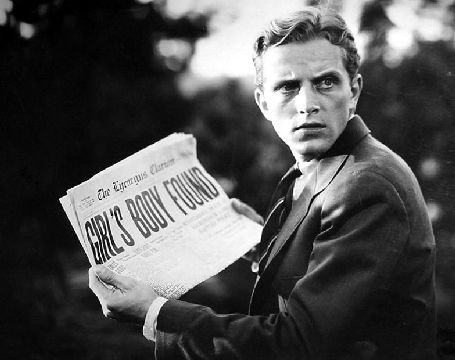An American Tragedy (1931) 
“Drama that happens around you everyday – when the wild life of impetuous youth burns away age-old barriers!”

Director: Josef von Sternberg
Cast: Phillips Holmes, Sylvia Sidney, Frances Dee
Synopsis: A social climber charms a debutante, seduces a factory worker and commits murder.
For some reason, all the ladies in An American Tragedy seem to fancy Clyde Griffith (Philips Holmes), even though he comes across as something of a morose drip. He’s a bellboy when we meet him, and he instantly catches the eye of the daughter of some rich guest. We can see his frustration at being so close to a world from which he is excluded, and we can understand that frustration even though it’s impossible to sympathise with him as the film progresses. That same night he’s a passenger in a car driven by a drunk driver which runs over a young girl before ploughing into a stall. Everyone does a runner, and even though he wasn’t to blame for the accident, Clyde lacks the moral backbone and strength of character to accept even his peripheral part in the incident and immediately packs his bags over the protests of his mother (Lucille La Verne). She is the proprietor of a mission for down-and-outs, exposure to which has presumably shaped Clyde’s amoral character.
He travels around, taking on menial jobs, and while once again working as a bellboy he learns that wealthy relatives are staying at the hotel in which he toils. Making himself known to them, he manages to get a job in their factory and rises to the position of manager of the stamping department. But even then he seems unhappy, loafing around the factory, seemingly oblivious to the way every young girl on the production line is making eyes at him.
All the above is told in an almost cursory fashion, providing background to the main thrust of the story, which begins when Roberta Alden steps into his office one day. She’s played by Sylvia Sidney, a cute and talented actress whose career never really endured beyond the 1930s for some reason. Roberta’s a sweet girl, and Clyde initially seems genuinely smitten by her, even going so far as to begin a relationship with her even though their employer forbids any fraternising between the management and the shop floor. But again, his selfish immaturity comes to the fore when the weather starts turning cold and Roberta is reluctant to allow him into her modest boarding room. Of course, it’s this aspect of the story — together with some typically bombastic acting from certain supporting actors — that dates An American Tragedy.
When it looks as though Clyde is going to dump her, Roberta finally relents and allows him entry into her boudoir and other more personal areas. It’s around this time that Clyde meets Sondra Finchley (Frances Dee), a beautiful and wealthy young girl who introduces him to the privileged lifestyle of which he has always dreamed. Things would be peachy if it wasn’t for Roberta — who suddenly doesn’t seem so alluring to the fickle Clive, and who, to make things even worse, announces that she is pregnant. Well — she doesn’t actually announce it; despite the movie being made before the Hays Production Code kicked in, it’s surprisingly coy about directly referring to the fact that she’s pregnant, even though it leaves us in no doubt that she is. And when Roberta starts putting pressure on Clyde to make an honest woman of her, his thoughts turn to murder.
An American Tragedy was remade in 1951 with Montgomery Clift in the role played here by Holmes but, while this version isn’t without its faults (which are due more to its age rather than any inherent flaws). it’s far superior to the Clift version, even though Griffith (or Eastman, as he was called in the later version), is a much more sympathetic character in the second movie. Holmes’s version is selfish and manipulative, and yet we never entirely lose some level of sympathy for him. Deep down he’s not a bad person, but he falls victim — like Roberta — to his own cowardice and weakness of character. These character flaws are gradually and painfully exposed during the trial, a lengthy sequence which was once one of the film’s strengths but which appears a little far-fetched and overacted today. The grandstanding acting style of Charles Middleton (Flash Gordon’s nemesis, Ming the Merciless) and Irving Pichel is a real drawback which isn’t helped by the way Samuel Hoffenstein’s screenplay call upon them to almost engage in fisticuffs. Overall though, An American Tragedy stands up well for its age.
(Reviewed 31st July 2013)
httpv://www.youtube.com/watch?v=SBr01rmMUmI
